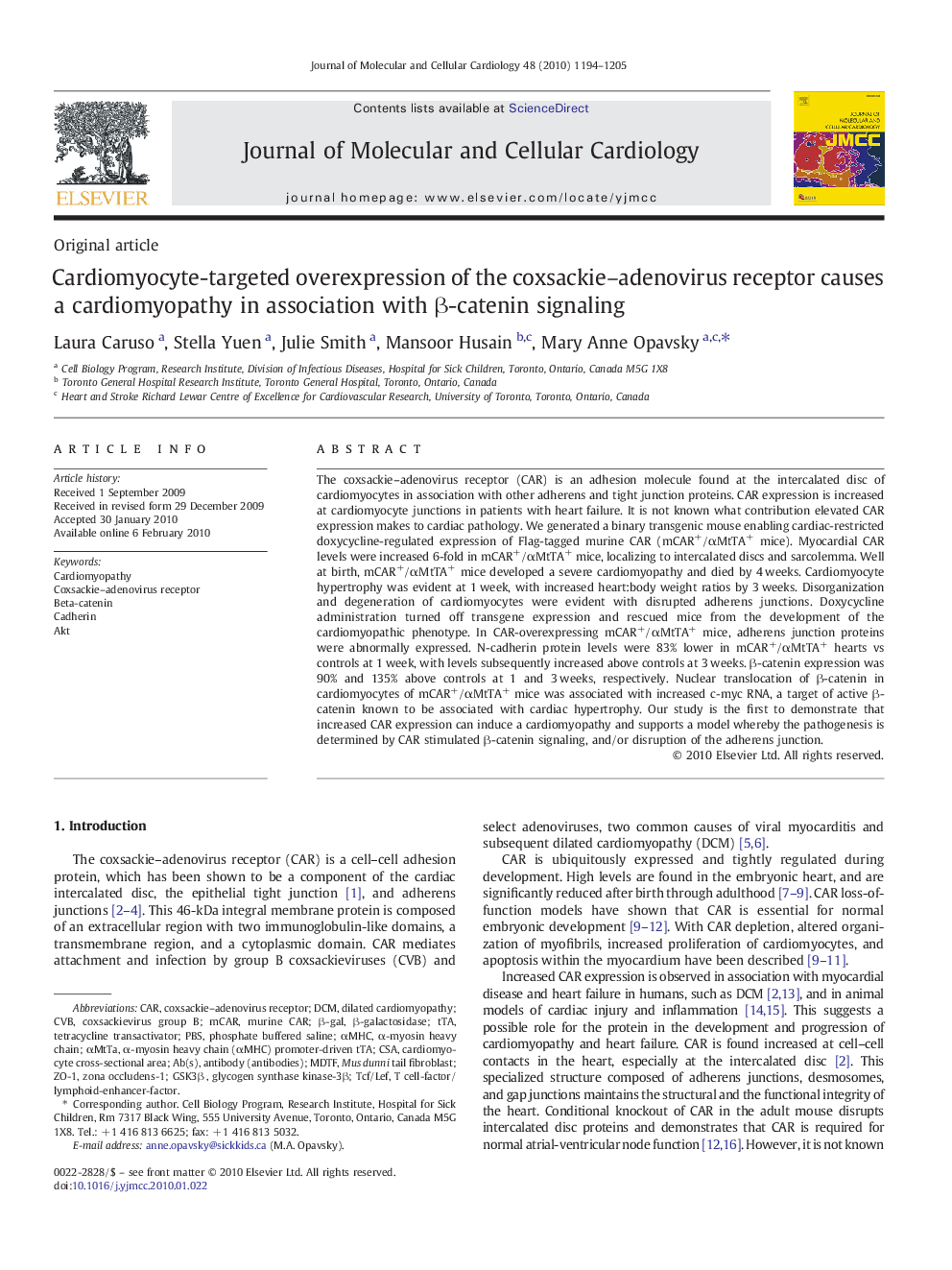| کد مقاله | کد نشریه | سال انتشار | مقاله انگلیسی | نسخه تمام متن |
|---|---|---|---|---|
| 10954189 | 1097846 | 2010 | 12 صفحه PDF | دانلود رایگان |
عنوان انگلیسی مقاله ISI
Cardiomyocyte-targeted overexpression of the coxsackie-adenovirus receptor causes a cardiomyopathy in association with β-catenin signaling
دانلود مقاله + سفارش ترجمه
دانلود مقاله ISI انگلیسی
رایگان برای ایرانیان
کلمات کلیدی
PBSMCARαMHCDCMCVBAb(s)β-galTTAZO-1TCF/LEF - TCF / LEFAkt - آکتCSA - ایالات مؤتلفهٔ آمریکاbeta-catenin - بتا کاتینینβ-galactosidase - بتا گالاکتوزیدازTetracycline transactivator - تتراسیکلین ترانسکتیویتورα-Myosin heavy chain - زنجیره سنگین α-میوزینPhosphate buffered saline - فسفات بافر شورCAR - ماشینcadherin - کادهرینCardiomyopathy - کاردیومیوپاتیDilated cardiomyopathy - کاردیومیوپاتی دیلاته، کاردیومیوپاتی کاملGlycogen synthase kinase-3β - گلیکوزین سنتاز کیناز 3β
موضوعات مرتبط
علوم زیستی و بیوفناوری
بیوشیمی، ژنتیک و زیست شناسی مولکولی
بیولوژی سلول
پیش نمایش صفحه اول مقاله

چکیده انگلیسی
The coxsackie-adenovirus receptor (CAR) is an adhesion molecule found at the intercalated disc of cardiomyocytes in association with other adherens and tight junction proteins. CAR expression is increased at cardiomyocyte junctions in patients with heart failure. It is not known what contribution elevated CAR expression makes to cardiac pathology. We generated a binary transgenic mouse enabling cardiac-restricted doxycycline-regulated expression of Flag-tagged murine CAR (mCAR+/αMtTA+ mice). Myocardial CAR levels were increased 6-fold in mCAR+/αMtTA+ mice, localizing to intercalated discs and sarcolemma. Well at birth, mCAR+/αMtTA+ mice developed a severe cardiomyopathy and died by 4 weeks. Cardiomyocyte hypertrophy was evident at 1 week, with increased heart:body weight ratios by 3 weeks. Disorganization and degeneration of cardiomyocytes were evident with disrupted adherens junctions. Doxycycline administration turned off transgene expression and rescued mice from the development of the cardiomyopathic phenotype. In CAR-overexpressing mCAR+/αMtTA+ mice, adherens junction proteins were abnormally expressed. N-cadherin protein levels were 83% lower in mCAR+/αMtTA+ hearts vs controls at 1 week, with levels subsequently increased above controls at 3 weeks. β-catenin expression was 90% and 135% above controls at 1 and 3 weeks, respectively. Nuclear translocation of β-catenin in cardiomyocytes of mCAR+/αMtTA+ mice was associated with increased c-myc RNA, a target of active β-catenin known to be associated with cardiac hypertrophy. Our study is the first to demonstrate that increased CAR expression can induce a cardiomyopathy and supports a model whereby the pathogenesis is determined by CAR stimulated β-catenin signaling, and/or disruption of the adherens junction.
ناشر
Database: Elsevier - ScienceDirect (ساینس دایرکت)
Journal: Journal of Molecular and Cellular Cardiology - Volume 48, Issue 6, June 2010, Pages 1194-1205
Journal: Journal of Molecular and Cellular Cardiology - Volume 48, Issue 6, June 2010, Pages 1194-1205
نویسندگان
Laura Caruso, Stella Yuen, Julie Smith, Mansoor Husain, Mary Anne Opavsky,